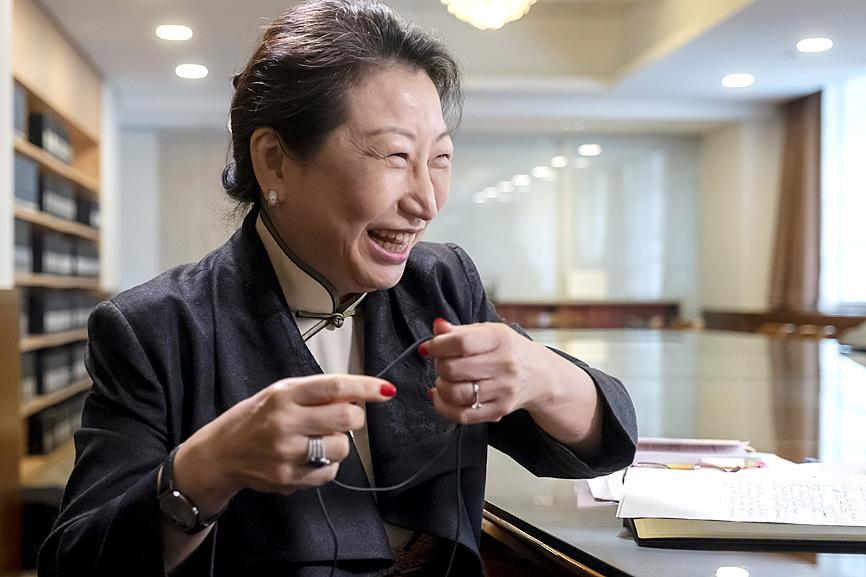Hong Kong’s top legal official told residents to steer clear of criticisms of the government that stray too far from the facts, as officials defend Beijing’s plan to overhaul the territory’s elections.
Hong Kong Secretary for Justice Teresa Cheng (鄭若驊) said in an interview yesterday that opinions are “no more than an utterance of no value” if the facts are not established.
Cheng was answering a question about what kind of criticism would be legal in Hong Kong as it implements a range of legal changes, including a National Security Law and the electoral overhaul.

Photo: Bloomberg
“Some of the statements that are sometimes uttered, that we hear, are actually not based on facts, or perhaps oblivious of the facts that exist,” Cheng told Bloomberg Television. “And I think that is what one has to be very careful not to embark upon.”
Officials in Beijing and Hong Kong are fanning out to defend the most significant changes to the territory’s political system since its return to Chinese rule in 1997.
Chinese lawmakers are expected later this week to approve a sweeping electoral overhaul that would require candidates for elected office to be “patriots” and secure nominations from a pro-Beijing committee.
The moves, including Beijing’s imposition of a National Security Law on Hong Kong outlawing speech deemed subversive or secessionist, have been criticized by the US and the UK as a breach of China’s treaty commitment to maintain the territory’s “high degree of autonomy.”
On Monday, a group of US lawmakers, including US senators Ed Markey and Mitt Romney, called on US President Joe Biden’s administration to work with allies and partners to support Hong Kongers.
Cheng — who was among senior officials sanctioned by the US Department of the Treasury in August last year on allegations of “undermining Hong Kong’s autonomy” — yesterday reiterated the government’s argument that the security law had restored stability.
“Please look at the actual facts and then see what’s happening in Hong Kong,” she said in response to the lawmakers’ statement.

VAGUE: The criteria of the amnesty remain unclear, but it would cover political violence from 1999 to today, and those convicted of murder or drug trafficking would not qualify Venezuelan Acting President Delcy Rodriguez on Friday announced an amnesty bill that could lead to the release of hundreds of prisoners, including opposition leaders, journalists and human rights activists detained for political reasons. The measure had long been sought by the US-backed opposition. It is the latest concession Rodriguez has made since taking the reins of the country on Jan. 3 after the brazen seizure of then-Venezuelan president Nicolas Maduro. Rodriguez told a gathering of justices, magistrates, ministers, military brass and other government leaders that the ruling party-controlled Venezuelan National Assembly would take up the bill with urgency. Rodriguez also announced the shutdown

Civil society leaders and members of a left-wing coalition yesterday filed impeachment complaints against Philippine Vice President Sara Duterte, restarting a process sidelined by the Supreme Court last year. Both cases accuse Duterte of misusing public funds during her term as education secretary, while one revives allegations that she threatened to assassinate former ally Philippine President Ferdinand Marcos Jr. The filings come on the same day that a committee in the House of Representatives was to begin hearings into impeachment complaints against Marcos, accused of corruption tied to a spiraling scandal over bogus flood control projects. Under the constitution, an impeachment by the

Exiled Tibetans began a unique global election yesterday for a government representing a homeland many have never seen, as part of a democratic exercise voters say carries great weight. From red-robed Buddhist monks in the snowy Himalayas, to political exiles in megacities across South Asia, to refugees in Australia, Europe and North America, voting takes place in 27 countries — but not China. “Elections ... show that the struggle for Tibet’s freedom and independence continues from generation to generation,” said candidate Gyaltsen Chokye, 33, who is based in the Indian hill-town of Dharamsala, headquarters of the government-in-exile, the Central Tibetan Administration (CTA). It

China executed 11 people linked to Myanmar criminal gangs, including “key members” of telecom scam operations, state media reported yesterday, as Beijing toughens its response to the sprawling, transnational industry. Fraud compounds where scammers lure Internet users into fake romantic relationships and cryptocurrency investments have flourished across Southeast Asia, including in Myanmar. Initially largely targeting Chinese speakers, the criminal groups behind the compounds have expanded operations into multiple languages to steal from victims around the world. Those conducting the scams are sometimes willing con artists, and other times trafficked foreign nationals forced to work. In the past few years, Beijing has stepped up cooperation